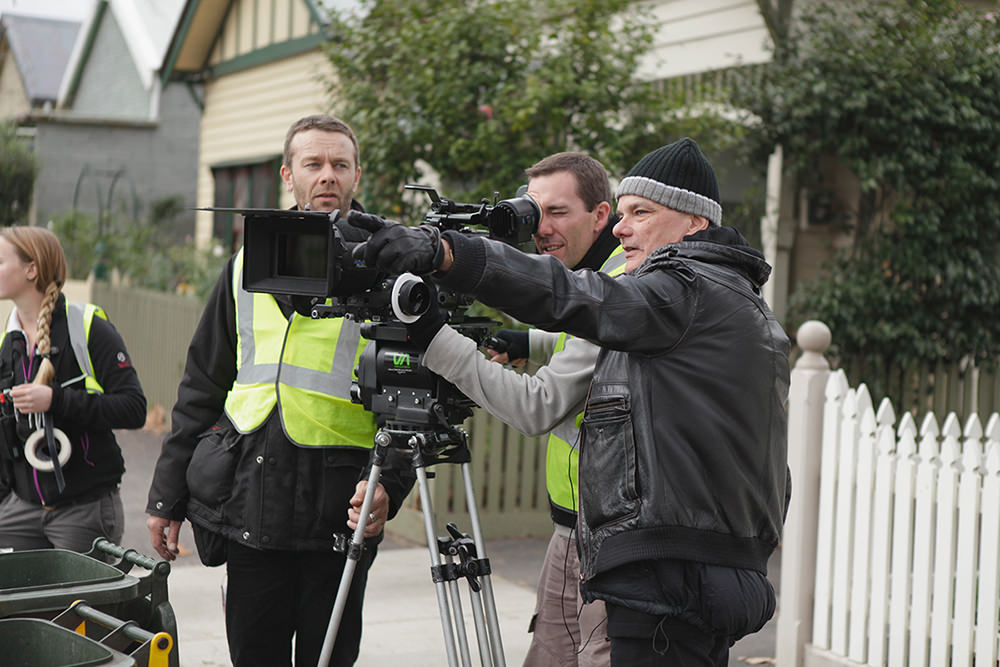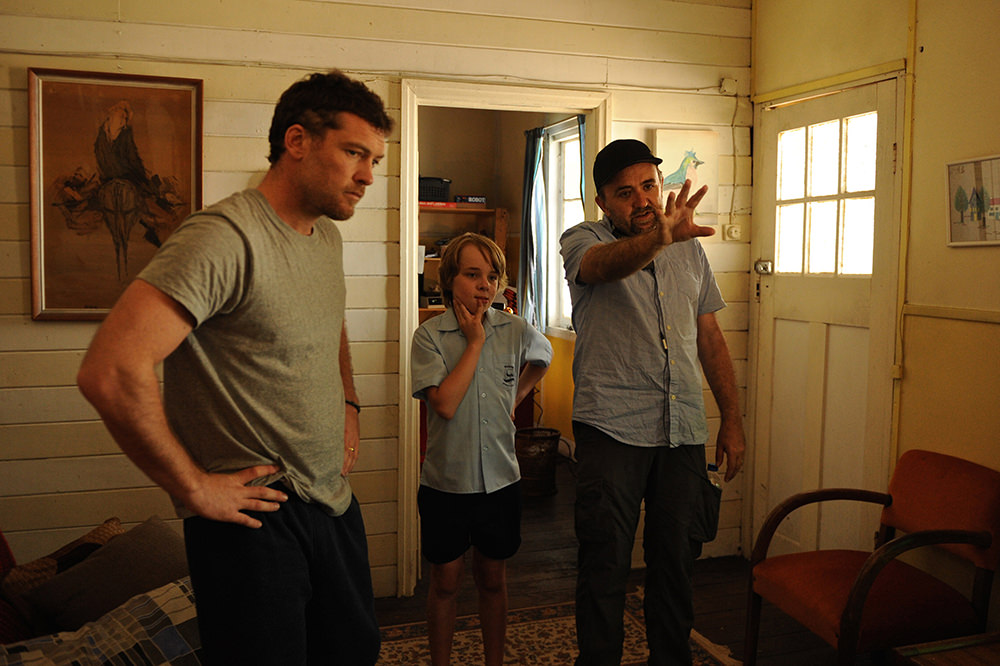Nurturing the next generation of screen directors
The Screen Australia/Australian Directors Guild Director’s Attachment Scheme is proving to be a valuable springboard for emerging directors, with an increasing emphasis on gender equality and cultural diversity.
 Geoff Bennett on the set of Love Child/Giovanni Lovisetto
Geoff Bennett on the set of Love Child/Giovanni Lovisetto
Kelli Cross is spending 10 weeks on attachment with director Rachel Perkins on Jasper Jones, the coming-of-age mystery scripted by Shaun Grant and Craig Silvey and produced by Bunya Productions David Jowsey and Porchlight Films’ Vincent Sheehan.
After the first week of pre-production in Western Australia, Cross observes, “I am learning all sorts from my experience so far and yet I know this is just going to be the tip of the iceberg. The most valuable lessons I will learn will no doubt be the technical aspect of this industry – something that I can only learn ‘on the job’ as I have never had the chance to be formally trained.
“It is unfamiliar territory for me having only worked on scripts that I have written – and I’m digging it. I am hoping that by working with Rachel and the rest of the crew, I am able to gain the confidence that I need to properly ‘own’ the set in future projects as a director.”
Cross is the first Indigenous recipient of the Director’s Attachment Scheme, which launched three years ago, funded by Screen Australia and managed by the ADG. Arguably the practical benefits are more pronounced among the tyro directors on TV dramas as each gets the chance to direct scenes.
Julietta Boscolo spent seven and a half weeks alongside director Geoff Bennett on two episodes of Playmaker Media’s Love Child. She directed two scenes set in Stanton House, the home for unmarried mothers, and Bennett then invited her to direct two further scenes with actors Miranda Tapsell and Andy Ryan.
“Geoff is really open and generous as a director and as directors, we look for similar things in our work,” she says. “So he was the perfect mentor for me to be attached to. Television is very fast-paced and demanding and because I wanted to really observe the shoot in detail, I literally was Geoff’s shadow on set.
“I had a ball. Geoff and I got along very well; I have never laughed so much on a production. The attachment was a great insight into high-end commercial television drama.”
Actor-turned director Christopher Stollery gleaned heaps from spending 12 weeks on series 4 of Playmaker’s House Husbands, mentored by director Grant Brown.
His candid assessment: “Grant has enormous experience in the medium and is an extremely personable and diplomatic chap. He’s adept at negotiating the cast’s idiosyncrasies, the crew’s low-patience threshold for indecision and the feedback from the many-headed executive (network, producers, writer-producers). I felt very welcomed by all at Playmaker and was very flattered by the vote of confidence to direct part of the episode, eight scenes in total.
“I have spent hundreds of hours on set over the course of my career but I’ve had very limited contact with the pre-production and post production processes. This attachment opportunity has successfully demystified the process for me and dispelled any previous concern that I would be capable of taking on the task.”
Playmaker Media executives are great supporters of the scheme. Sue Seeary, the executive producer of House Husbands and Love Child, says, “Julietta and Chris were exposed to the rigours of TV drama production in all aspects of the production cycle, preparation, execution and post and were given parts of the scripts to direct themselves. Let’s hope we all have the opportunity of working together on future projects.”
Beth Armstrong, who is being mentored by Mel Gibson on Hacksaw Ridge, was the first attachment since the ADG committed to have women fill 50% of the attachments and for 75% to reflect both gender equality and cultural diversity.
ADG CEO Kingston Anderson says one of the great benefits of the scheme has been identifying for the first time the next generation of directors from the applicants, a pool of 30-60 rising talents. He is keen to supplement the scheme by arranging for state agencies and private investors to fund up to five attachments each year.
Screen Australia senior development executive Nerida Moora says, “The ADG has wrangled some fantastic opportunities for emerging directors. With the Director’s Attachment Scheme, Enterprise People and the Creative Talent Suite, we are providing multiple doors for attachments and placements. We are also really pleased that the Guild has agreed to 75% in regards to the gender and cultural diversity of the attachments”
Nora Niasari, who was mentored by Emma Freeman on Matchbox Pictures’ drama Secret City commissioned by Foxtel, exemplifies cultural diversity. Born in Iran, she was raised in Australia in a household where Farsi was the only language. “My mother exposed me to Iranian traditions, poetry and cinema from a very young age,” she says. “Iranian cinema made after the 1979 revolution has had a significant influence on my filmmaking sensibilities. In February 2015, I completed a filmmaking workshop with Iranian filmmaker Abbas Kiarostami in Barcelona, whom I consider a mentor and a true master of cinema.”
On Secret City she watched Freeman from script meetings to preparing actors and her visualisation process with DOP Mark Wareham and production designer Felicity Jane Abbott.
“Emma is an actor’s director who works with minimum camera setups and multiple takes, which means she focuses most of her time on crafting performances,” Nora says. “ I learnt a great deal about how to best communicate with actors to achieve the emotional beats of each scene within a limited time frame.”
While none of the scheme’s recipients has yet landed his or first feature directing assignment, the ADG and Screen Australia are confident that will happen soon.
 Paper Planes director Robert Connolly on the set with Sam Worthington and Ed Oxenbould/David Dare Parker
Paper Planes director Robert Connolly on the set with Sam Worthington and Ed Oxenbould/David Dare Parker
Writer-director Matthew Moore, who was attached to Rob Connolly on Paper Planes, has since directed a short, Problem Play, for Goalpost Pictures, funded by Screen Australia’s Hot Shots: Short Fiction Funding.
Moore, who is developing a feature with Goalpost’s Lauren Edwards, says working with Connolly was a “hugely helpful stepping stone in terms of getting my head around my first feature.” He adds, “It was great watching someone so highly experienced dealing with all the problems and issues that a feature can throw at you.”
Dimitrios Pouliotis spent 18 weeks with director Matt Saville on Madman Production’s A Month of Sundays, from the first week of pre through to final mix. “Matt was fantastic to be around and learn from,” he says. “He was welcoming, open and generous, always finding time to impart his knowledge and experience.
“I learned more in these few months about production processes, rehearsals, importance of communication, cast and crew relationships, decision making, and adaptability, than in all other projects I’ve been involved with.”
After directing numerous TVCs, Ariel Martin was delighted to get the chance to observe Neil Armfield at close hand for eight weeks on Goalpost’s Holding the Man. “Neil could not have been more inclusive,” he says. “He made the whole experience as meaningful as I hoped it would be, and he gave me the opportunity to direct a couple of action shoots during the football sequence. I want to direct features and TV but features are my dream.”
Stephen McCallum relished spending four months with Tony Ayres on Matchbox Pictures’ Cut Snake, starting with a 3-day script workshop in Melbourne. “Tony was very generous and welcoming; he saw the collaboration as a way to get the best out of me,” he says.
That led to McCallum him being hired as second unit director on Endemol Australia’s Gallipoli, directed by Glendyn Ivin. He is now developing a feature for See Pictures and he directed second unit on that company’s science fiction thriller Otherlife, directed by Ben C. Lucas.
Ayres is equally complimentary, describing McCallum as a “genuine talent.” Ayres adds, “We need to promote new talent because it is harder than ever now to get a break.”

What to read next
Australians have entered a new and exciting age of television, says the director behind shows including The Beautiful Lie, Gallipoli and Puberty Blues.
16 Nov 2015
Caris Bizzaca